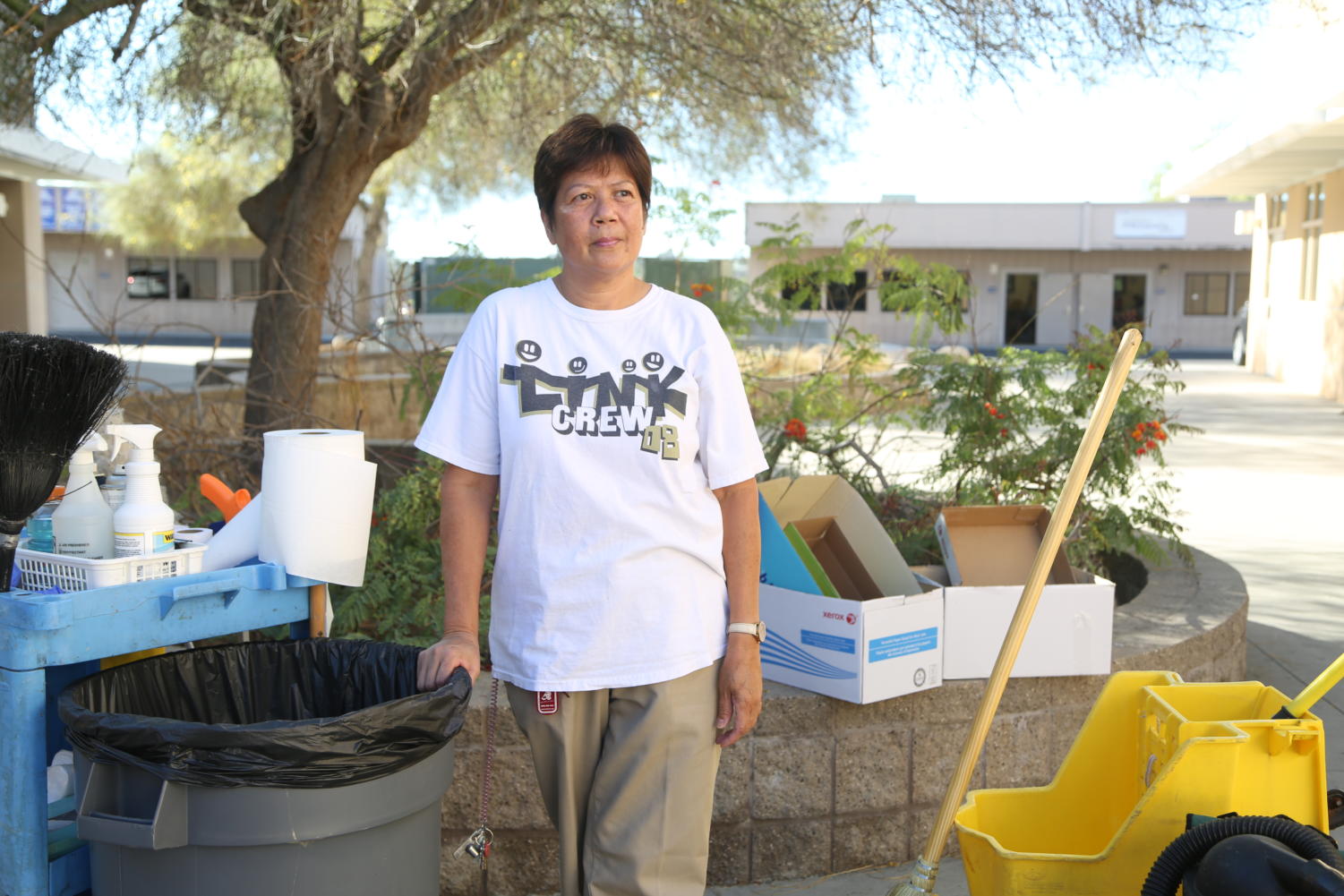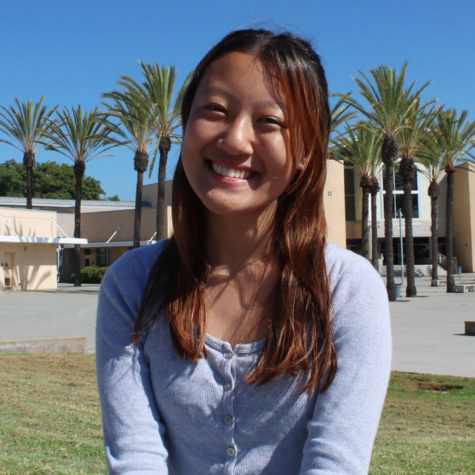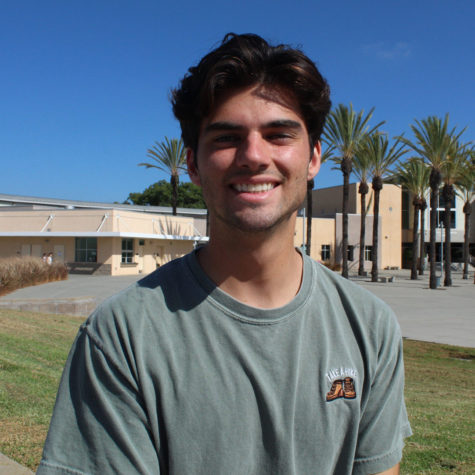Understaffing overwhelms custodians
October 14, 2022

On June 9, after the class of 2022 graduates had cleared, the families and friends left the bleachers, and nothing was left in the stadium but littered graduation pamphlets, empty water bottles and colorful ribbons, custodians Fe Lapitan and Abe Lauricio began to clean.
For three hours, the 88-degree, blazing sun bore down on the two lone custodians as they worked together to fold all 950 chairs, remove all 552 name tags, and cut about 400 zip ties after the ceremony.
In all of her 20 years of working at Westview, Lapitan said she has never had a worse experience. Even today, she cannot recount the day without becoming tearful.
“The hardest part of my life here at Westview [was that graduation]—I will be retiring in maybe less than 3 years—and I can not forget,” Lapitan said. “I almost cried at that time. I said ‘Oh my god.’ But what can we do? [Custodians] have to do it. We have to do it. Even [now], sometimes, [I say], ‘Oh my god, I have to retire.’ It’s hard now at Westview; we really need help.”
The next day, despite being exhausted, Lapitan and Lauricio came back to pick up classroom buildings’ loose trash and tie up trash bags. Because teachers piled old papers, books, and other assorted items in their trash bins, each building produced a cart-full, or 10 bags, of trash on that final day of the year.
Before she was a custodian, Lapitan dreamed of becoming a flight attendant. She used to marvel at airplanes that flew over her elementary school in the Philippines and she resolved that one day she would work inside an airplane. She admired how beautiful the flight attendants were on TV.
Growing up as a natural extrovert, as soon as she got home from elementary and high school, she’d drop off her bag and change out of her blue and white, private school uniform to go back to playing in the streets of a province in the Philippines, Ilocos Sur. Today, conversation with her flows easily; she sticks out her tongue whenever she makes a mischievous joke.
Now, during hot summer days when she is not at work, instead of playing outside, she chooses to interact with her friends on Facebook and post selfies in off-the-shoulder tops while peering over her shoulder, a pose her daughter recommended.
In the Philippines, Lapitan received her Bachelor’s degree in Banking and Finance. Instead of a flight attendant, she worked as a bank teller. The pay, however, was meager in the Philippines, and Lapitan dreamed of a better life; first, in Saudi Arabia as a maid and then, on March 2, 1990, as a maid and later custodian in the U.S.
Lauricio also dreamed of greener pastures in the United States. His brother-in-law was a lieutenant in the U.S. Navy and advertised the country as a place of abundant food, friends, and experiences. Leaving behind in the Philippines his “school bus” service, where he took students to and from school in his Jeep, and buy-and-sell business, where he purchased goods from one place and sold to another,, Lauricio came to America in 2000 and started working for Westview in 2002, three months after the school opened.
But his first tenure at Westview was short-lived. He was laid off in 2003 due to budget cuts and transferred to Mesa Verde, but he came back in 2005; he was laid off again in 2009 and transferred to Pomerado Elementary School; he finally came back to stay in 2010.
For Lauricio, he finally can look forward to retirement from Westview. In the past, whenever he had to leave the school, he used to write letters to former Custodial Supervisor Art Wolfe.
“Every time I got laid off, every time I left Westview, I wrote him a letter,” Lauricio said. “I [would say], ‘Thank you, guys, for having me here. But I’ll keep on knocking at your door. I’ll be coming back. Wait for me.’”
While he has been here, at its height, the Westview custodial crew consisted of 12 custodians; now, there are only eight.
According to new Custodial Supervisor Steven Kraemer, help isn’t so readily available due to a shortage of custodians throughout the district, which only has about 14 custodial subs.
“[There] should be a lot more [subs] because there are [about] 240 custodians [in the district.] And that’s why we’re short a lot,” Kraemer said. “There could be 20 or 30 out in a day and [the current subs] can only cover half of them.”
Almost every school day since Westview opened, Lapitan has worked until 11 p.m. Recently, when she takes her dinner break, which is never on time, she said her joints ache and her legs cramp. She takes Aleve, a pain reliever, every day to minimize the muscle pain from picking up and taking out the trash, vacuuming, wiping down and dusting tables, cleaning toilets, and helping at sporting events by cleaning up after games.
The pain extends past physical bounds. Emotionally, Lapitan said she also feels exhausted.
Even outside of school, Laptitan simply stays home, eats and cleans. She also still looks after her 32-year-old and 27-year-old children. Despite her exhaustion, Lapitan said she needs the financial benefits of her job.
“I’m not crying because of my work,” she said. “I’m crying because if I retire, I [won’t have] health insurance. So what can I do? I have to finish. I have to work a few more years.”
According to Lapitan, since the custodian shortage, toilets often are simply flushed instead of fully cleaned. Work gets piled up and carries on to the next day, meaning that the less pressing jobs of cleaning floors and toilet bowls aren’t prioritized.
Campus Security Guard Kevin Ashwell said that students at Westview have added excess work to custodians, especially due to a rise of vandalism and littering on campus in recent years.
“With the new California law that every kid gets free lunches, these kids are understanding that, ‘oh, it’s free. I’ll take as much as I want.’ And then they just throw it everywhere,” Ashwell said. “They don’t worry about cleaning up after themselves. They push it on everybody else to where it’s a lot more work for custodians.”
Lapitan said that she wishes students would consider their actions that affect the workload of the custodians.
“I don’t know how [the school’s] going to tell [students to stop trashing the campus], email them one by one?” Lapitan said. “I think [students] would know better, you know?”
Every piece of trash in the quad, every wet toilet paper ball on the bathroom mirror, and every piece of gum in the sink affects the workload of custodians.
“[The bathrooms] are completely just not taken care of [by the students], they’re destroyed and everybody uses the bathroom,” Ashwell said. “Like why? Why mess with them?”
Some staff members, like teacher Shannon Kreamer, have tried to lessen the burden on custodians. Kreamer teaches AP Environmental Science, a class that, according to the course catalog, educates students about “how their livelihood is sustained and concerned about the future of the planet.”
She said she encourages students who sit outside of her classroom during lunch to pick up their trash, strategically places trash cans in well-populated areas rather than the back of the school, and puts up her classroom chairs to make it easier for custodians to efficiently sweep and pick up trash.
“It’s more than just being an environmental science teacher and protecting our environment,” Kreamer said. “It’s showing respect. It’s just a responsibility that everyone has to be part of this campus—part of this community—to pick up their trash. [Students] are young adults, and just knowing that it’s everyone’s effort to help. We have such a beautiful campus. We have a huge campus. We live in a beautiful community, and just making sure that we recognize what we have, and not take that for granted. And it’s a small act to pick up your trash. We’re not kindergarteners anymore. It’s something that we’re all very capable of doing.”
Kreamer often interacts with Lauricio as she stays after school and is there when he cleans her building.
“[Lauricio] surprises me by how much he remembers about any personal stories that I share [like the] names of my husband or of my cousin,” Kreamer said. “[I wonder] how does he remember that? Now, he asks how my pregnancy is. He talks about trips to the Philippines that he’s taken or is going on. We just kind of check in on each other.”
He remembers her husband’s name, Tommy, because his best friend named Tommy passed away in 2017 from blood cancer. He remembers her cousin’s name, Marissa, because his favorite actress’ name is Marisa Tomei.
“This is my second home away from home,” he said. “The teachers [and] the staff [are] the best. I was a [custodial] sub before; I was going to different schools, so I got to meet different teachers. I got to [see] different activities [and] different styles of cleaning. But I think Westview is the best because almost all the teachers here are nice, and the students too, unlike other schools.”
For Lapitan, she’s also content with her time at Westview.
“I love [the students],” Lapitan said. “I count them as my kids. Even though I [might] say, ‘Oh, that’s a mess. The bathroom is a mess.’ They’re like my kids. They’re my kids. ‘Just be patient with their mess.’”
Each day, she still tries to find pride and dignity in the work she does.
“We have to dust the tables, pick up the trash, sweep around the buildings because I don’t want it so messy,” Lapitan said. “I want it to look good on my own routes, so they will see that my route is the best.”



